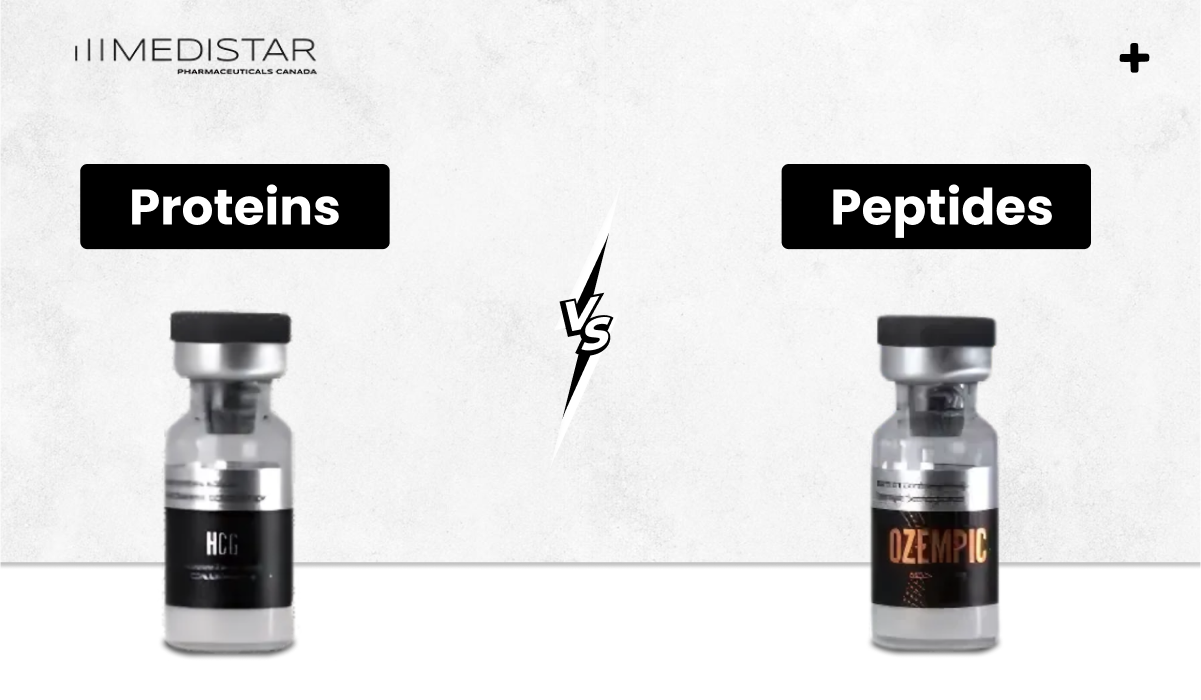In the world of biology and your every crucial life science, you will always find proteins vs peptides dilemma. They both are important concepts that impacts everything from muscle growth and hormone regulation. While they both come from amino acids, the difference between peptide and protein lies in their structure and function. Let’s break it all down and explore what makes each of them unique.
What Are Proteins and Peptides?
Amino acids make proteins and peptides. However, the key distinction lies in the number of amino acids and the complexity of the molecule.
Peptides are usually formed from a handful to around fifty amino acid links. Once the number goes beyond that, the chain is generally known as a protein. These shorter chains (peptides) are tighter in structure and less bulky. Their size gives them a simpler makeup compared to proteins. Because of this, peptides often act faster and more efficiently in certain body functions.
They carry less structural complexity and are easier for the body to work with. Unlike proteins, which are long and often folded into intricate shapes, peptides stay fairly straightforward.
Their minimal size allows them to act quickly in biological processes. Because of all this, peptides are more basic and lightweight than proteins. According to Britannica, the primary difference peptide and protein is indeed based on this size threshold.
Structural Differences
Their layout is plain and lacks the detailed folding seen in larger molecules. Compared to other biological compounds, they maintain a neat and uncluttered form. This basic structure helps them move and function easily within the body.
Proteins, on the other hand, have a more intricate 3D structure. This includes folding into specific shapes like helices and sheets, which are crucial for their function.
Think of peptides as text messages—short, specific, and quickly delivered—while proteins are more like detailed reports, complete with formatting, graphs, and conclusions.
Functions in the Body
This is where the proteins vs peptides conversation gets more exciting.
- Peptides often serve as messengers in the body, helping to manage tasks like energy use, immune response, and hormone activity. They play a role in guiding how cells behave and communicate. One well-known peptide that helps regulate blood sugar is insulin. Such compounds are vital for keeping internal functions balanced.
- Proteins have a broader range of roles: enzymes (like amylase), structural components (like collagen), transporters (like hemoglobin), and immune system agents (like antibodies).
So, while peptides send the message, proteins are often the action-takers in biological systems.
Digestion and Absorption
The body processes dietary proteins into peptides in the digestive function and it is very crucial. The small intestine needs individual amino acids for its functions and that are provided by them. This is another key element in the difference between peptide and protein.
Peptides can be absorbed faster and may trigger quicker biological responses – something athletes and bodybuilders find useful.
Medical and Fitness Applications
Thanks to their specific actions, peptides are becoming increasingly popular in therapeutic treatments and performance enhancement. They’re often used in anti-aging products, muscle recovery, and fat loss.
If you’re interested in supplements or performance aids, you might explore places to buy peptides online. Similarly, anabolic steroids, which are derived from or mimic proteins, are also used by some individuals to enhance muscle mass—just be sure to use trusted sources like Buy Steroids Online in Canada.
When sourcing such products, always ensure you’re purchasing from reputable brand providers to guarantee safety and effectiveness.
Summary of Key Differences
| Feature | Peptides | Proteins |
| Size | 2–50 amino acids | 50+ amino acids |
| Structure | Simple, linear | Complex, folded |
| Role | Messaging (hormones, signaling) | Structural, enzymatic, transport |
| Digestion | Absorbed faster | Broken down into peptides first |
| Application | Skincare, weight loss, muscle recovery | Enzymes, immunity, body functions |
The Overlap
Despite these differences, the line between proteins vs peptides isn’t always sharp. In some cases, peptides can function like proteins, and some small proteins are often referred to as peptides. The distinction is primarily used for convenience in science and industry.
As CellGS points out, the terminology helps in developing targeted therapies and supplements.
Final Thoughts
Understanding the difference between peptide and protein is more than just academic—it’s key to making informed decisions about your health, nutrition, and fitness goals. Whether you’re considering advanced therapies or exploring performance supplements, knowing the roles of these molecules can give you an edge.
Always consult a healthcare professional before using any new product and make sure you buy from recognized Brand Names for quality assurance.
As science evolves, so does our understanding of the incredible roles these biomolecules play. So the next time you come across a product label or a health claim, you’ll know exactly what to look for in the proteins vs peptides conversation.
Disclaimer: This content is for informational purposes only and is not medical advice. Always consult a healthcare professional before using any steroids, SARMs, or supplements. Use products responsibly and in accordance with Canadian laws.





